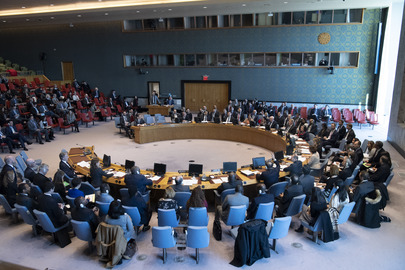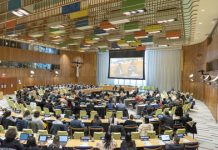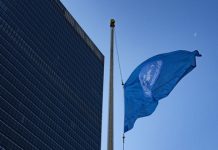Gaza death toll passes 45,000 as UN school suffers new deadly strike
Authorities in Gaza reported on Monday that more than 45,000 people have been killed in the enclave in the last 14 months, as humanitarians condemned new deadly airstrikes across the war-torn Strip, including on a UN school-turned-shelter.
Images taken at the school in Khan Younis showed the apparent impact point of one shell in a concrete upper floor where people had been living at the time of the attack late Sunday night.
According to the UN agency for Palestinian refugees, UNRWA, 13 people died and 48 were injured during the strike.
The victims included 17-year-old Mona whose mother was killed in the attack, said UNRWA Senior Emergency Officer, Louise Wateridge:
“They were in one of the classrooms at the school when the strike happened. They were all sitting around a phone, they were watching a television show on the phone together. And then the strike happened. Very graphic details. The sister was providing their mother was crushed to death under the rubble and died immediately…I know I can talk to you now and tell you these stories; tomorrow. I can be telling the same stories with different names. That’s the reality that we have on the ground here in the Gaza Strip.”
Meanwhile, famine “continues to loom in the north” and humanitarian access remains “severely restricted”, according to the UN Children’s Fund, UNICEF.
Echoing those concerns, the UN World Food Programme (WFP) warned Gazans were now desperately worried about not getting enough to eat. In the absence of a ceasefire, “we need to find a way of getting all the food that we have outside Gaza in”, said WFP’s Head of Emergency Communications, Jonathan Dumont.
Cyclone Chido: Humanitarians warn of scale of need in devastated areas
After Cyclone Chido made landfall in the French island territory of Mayotte at the weekend, leaving an unknown number dead and destruction on a massive scale, aid teams confirmed on Monday that the weather system has reached Cabo Delgado province, in northern Mozambique.
Around two million people are at risk in Mozambique, including 627,000 identified as being at “high risk”.
In an alert, the UN World Food Programme (WFP) said that voluntary evacuation plans began to be circulated on 8 December, reaching more than 400,000 people.
The UN agency reported that in less than 24 hours, emergency food assistance reached around 500 cyclone-affected families in temporary accommodation centres in Pemba district alone.
Humanitarians have been on high alert since the French Indian Ocean territory of Mayotte experienced its worst cyclone in almost a century on Saturday. Media reports showed trees uprooted and houses smashed, while communities faced power cuts and fears over a lack of drinking water.
The UN and partners are already providing support with assessment and aid efforts, according to the UN aid coordination office, OCHA.
Migrant workers are key to global economy: UN labour agency
Turning to the global economy now, where new data shows the key role played by migrant workers who still lack decent work opportunities and protections, the UN International Labour Organization (ILO) said on Monday.
According to the ILO, there are around 168 million migrant workers worldwide; more than 155 million were officially employed and around 12 million were not.
In 2022 – migrants in the labour force were mostly in northern, southern and western Europe, but also in North America and the Arab States.
Less than half of migrant women had a job compared to nearly 73 per cent of men, and unemployment among migrant women is also far higher than for their male counterparts.
This trend is likely driven by factors such as gender discrimination and limited childcare options, ILO said.
The UN agency found that nearly seven in 10 migrants work in the services sector, linked to the global demand for care and domestic work, which employs nearly three in 10 migrant women.
ILO Director-General, Gilbert F. Houngbo said that migrant workers remained “indispensable in addressing global labour shortages and contributing to economic growth”. And he insisted that “ensuring their rights and access to decent work (was) not only a moral imperative but also an economic necessity”.
Daniel Johnson, UN News
Music composed and produced by Joachim Harris. All rights reserved.
Source of original article: United Nations (news.un.org). Photo credit: UN. The content of this article does not necessarily reflect the views or opinion of Global Diaspora News (www.globaldiasporanews.com).
To submit your press release: (https://www.globaldiasporanews.com/pr).
To advertise on Global Diaspora News: (www.globaldiasporanews.com/ads).
Sign up to Global Diaspora News newsletter (https://www.globaldiasporanews.com/newsletter/) to start receiving updates and opportunities directly in your email inbox for free.






























